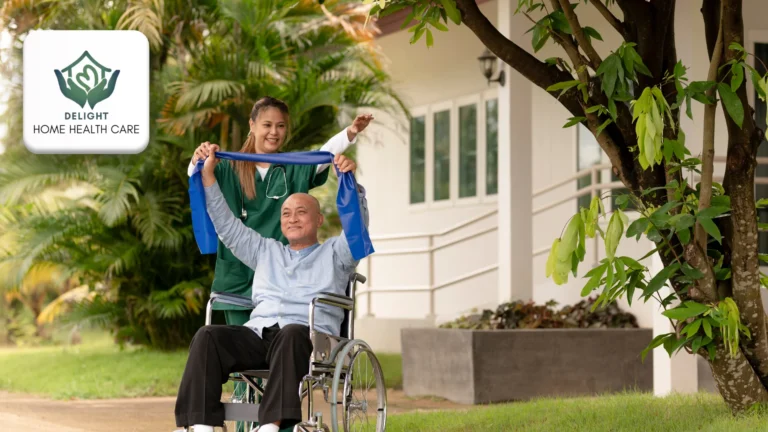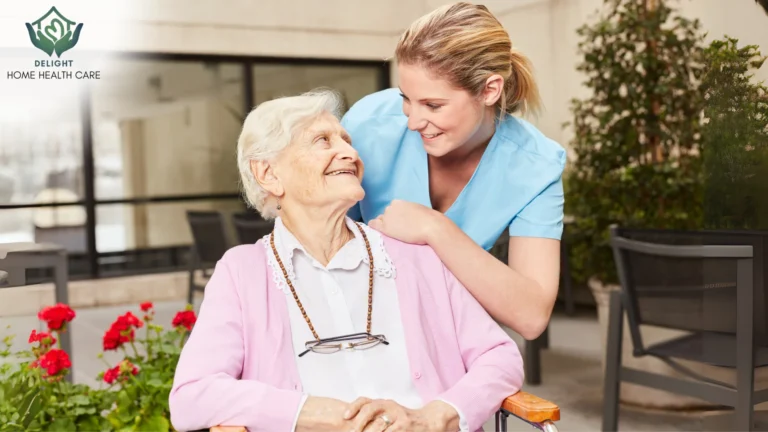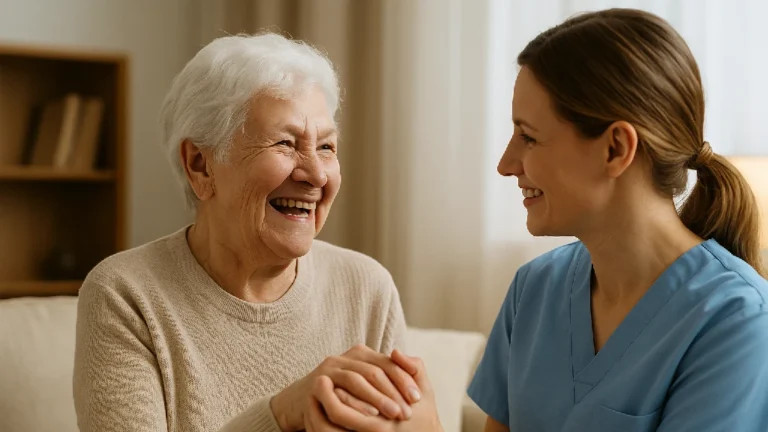-
603 Watt Blvd SW
We speak English & French!
The Role of Certified Caregivers in Delivering Compassionate Home Care

Introduction
As the demand for home health care continues to rise, the role of certified caregivers has become more essential than ever. Whether providing assistance to seniors, individuals with disabilities, or those recovering from illness, certified caregivers play a critical role in delivering compassionate, personalized, and professional care right in the comfort of home.
In this blog, we’ll explore the importance of certified caregivers, their key responsibilities, and how their expertise enhances the quality of life for those in need.
Table of Contents
Why Certified Caregivers Are Essential in Home Care
Certified caregivers bring professional training, experience, and empathy to ensure the well-being of individuals receiving home care. Their expertise extends beyond basic caregiving tasks—they provide both physical and emotional support, ensuring clients maintain their independence, dignity, and quality of life.
Here’s why certified caregivers are indispensable:
✔ Expert Training: Certified caregivers undergo specialized training in patient care, emergency response, and recognizing health changes, ensuring they are well-equipped to support clients.
✔ Personalized Assistance: They tailor their approach based on each individual’s unique needs, preferences, and health conditions.
✔ Companionship & Emotional Support: Caregivers provide not just physical care but also emotional reassurance, social engagement, and companionship to reduce loneliness.
✔ Peace of Mind for Families: Families gain peace of mind knowing their loved ones are receiving expert care in a familiar and comfortable environment.
✔ Monitoring & Reporting Health Changes: While caregivers do not perform medical procedures like wound care or checking vitals, they are trained to observe changes in a client’s health condition and promptly notify nurses or healthcare professionals when necessary.
Key Responsibilities of Certified Caregivers in Home Care
1. Personal Care Assistance
Certified caregivers assist with daily living activities such as:
✔ Bathing, grooming, and dressing
✔ Toileting and incontinence care
✔ Mobility support and transfers
✔ Feeding and meal preparation
These tasks ensure that clients maintain their dignity and independence while receiving essential personal care.
2. Health Monitoring & Communication with Nurses
While caregivers do not provide direct medical care, they play a crucial role in observing and reporting any changes in a client’s condition. Their responsibilities include:
✔ Monitoring for signs of skin integrity issues, swelling, or discomfort
✔ Observing changes in mobility, appetite, or mental status
✔ Notifying nurses or healthcare professionals if they suspect any health deterioration
✔ Assisting with physical therapy exercises as directed by a therapist
This ensures that any potential health concerns are identified early and addressed by medical professionals.
3. Companionship & Mental Well-Being
Social isolation is a significant issue for seniors and individuals with limited mobility. Certified caregivers help combat loneliness by:
✔ Engaging in meaningful conversations
✔ Encouraging recreational activities
✔ Accompanying clients to appointments and social outings
✔ Providing cognitive stimulation exercises
By fostering emotional connections, caregivers enhance mental well-being and reduce feelings of loneliness.
4. Household Support & Safety Assistance
A safe and clean home environment is crucial for overall health. Caregivers assist with:
✔ Light housekeeping and laundry
✔ Grocery shopping and meal preparation
✔ Ensuring fall prevention and home safety modifications
This ensures that clients can live comfortably and securely in their homes.
5. Specialized Care for Seniors & Individuals with Disabilities
Certified caregivers receive training to handle complex care needs, including:
✔ Assisting individuals with Alzheimer’s and dementia
✔ Supporting clients with Parkinson’s disease
✔ Providing post-stroke mobility assistance
✔ Helping children and adults with disabilities with daily tasks
Their expertise ensures that individuals with special needs receive the appropriate level of care to maintain their well-being.
How to Choose a Certified Caregiver for Your Loved One
Selecting the right caregiver is crucial for ensuring trust, comfort, and high-quality care. Here’s what to look for:
✔ Certification & Training: Verify that the caregiver has proper certifications and credentials in home health care.
✔ Experience & Specialization: Consider caregivers with experience in handling specific medical or personal care needs.
✔ Compassion & Patience: The best caregivers are those who demonstrate genuine empathy, patience, and a commitment to care.
✔ Background Checks & References: Choose caregivers from a reputable home care agency with thorough screening processes.
At Delight Home Health Care, we ensure that all our caregivers are fully certified, professionally trained, and dedicated to delivering compassionate home care.
Frequently Asked Questions (FAQs)
What qualifications should a certified caregiver have?
A certified caregiver should have formal training in home care, emergency response, and patient support. Many also hold certifications such as Personal Support Worker (PSW) or Health Care Aide (HCA).
What is the difference between a caregiver and a nurse?
Caregivers assist with daily living activities, companionship, and health monitoring, while nurses provide medical treatments, administer medications, and manage complex health conditions.
Can caregivers perform medical tasks like wound care or checking vitals?
No, caregivers do not perform wound care, blood pressure monitoring, or other medical procedures. However, they are trained to observe any health changes and notify nurses or healthcare professionals.
How do I know if my loved one needs home care?
If your loved one is struggling with daily tasks, mobility, medication management, or social isolation, home care may be beneficial. A professional assessment can help determine the right level of support.
Is home care more affordable than a nursing home?
Yes! Home care is often more cost-effective than residential facilities, as families can choose services based on their specific needs rather than paying for full-time institutional care.
Conclusion
Certified caregivers are the heart of home health care, providing essential personal, emotional, and daily living support that enhances the quality of life for individuals in need. Whether assisting seniors, individuals with disabilities, or those recovering from illness, their role is invaluable in promoting comfort, independence, and well-being.
If you’re looking for trusted, certified caregivers in Edmonton, Delight Home Health Care is here to help. Contact us today to explore our personalized home care solutions for your loved ones.



